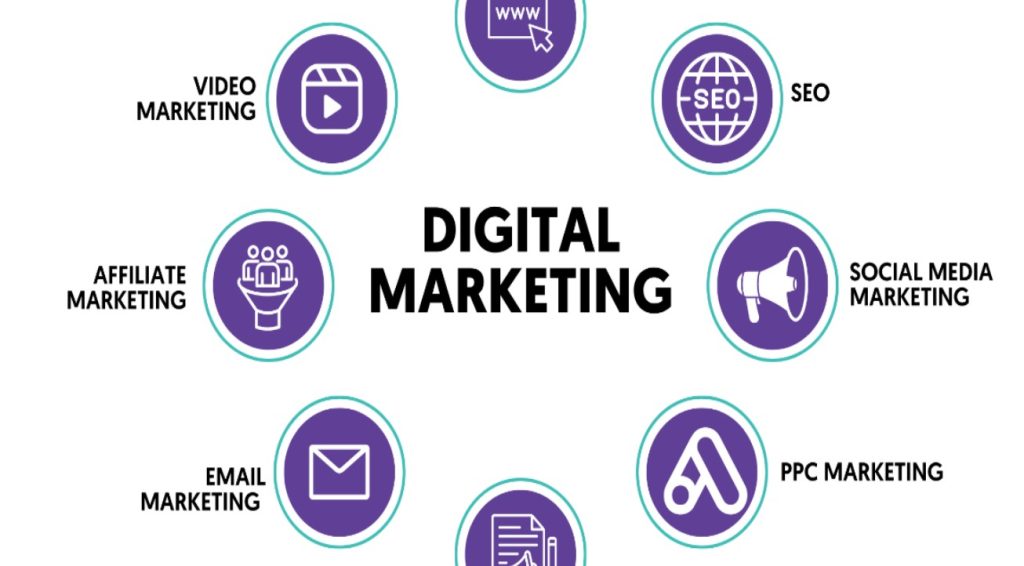Here’s a comprehensive overview of digital marketing, structured to cover various aspects in depth. I’ll break it down into sections, which you can expand upon as needed.
Outline
- Introduction to Digital Marketing
- Definition and significance
- Evolution of marketing in the digital age
- Key Components of Digital Marketing
- Search Engine Optimization (SEO)
- Content Marketing
- Social Media Marketing
- Email Marketing
- Pay-Per-Click Advertising (PPC)
- Affiliate Marketing
- Influencer Marketing
- Strategies for Effective Digital Marketing
- Understanding your audience
- Setting clear goals
- Crafting a unique value proposition
- Choosing the right channels
- Measuring Success in Digital Marketing
- Key Performance Indicators (KPIs)
- Tools for tracking and analytics
- Adjusting strategies based on data
- Challenges in Digital Marketing
- Keeping up with trends
- Data privacy concerns
- Managing digital reputation
- Future Trends in Digital Marketing
- Artificial Intelligence and machine learning
- Voice search optimization
- Video content and live streaming
- Personalization and customer experience
- Conclusion
- Recap of key points
- Importance of adaptability in digital marketing
1. Introduction to Digital Marketing
Definition and Significance
Digital marketing refers to the use of digital channels and technologies to promote products and services. This includes a wide array of online platforms such as search engines, social media, email, and websites. With the advent of the internet and the proliferation of smartphones, digital marketing has become a vital part of any comprehensive marketing strategy.
Evolution of Marketing in the Digital Age
The evolution from traditional marketing to digital marketing has transformed how businesses connect with consumers. In the past, marketing was largely one-directional, with companies broadcasting messages through print, radio, and television. Today, digital marketing facilitates two-way communication, allowing for real-time feedback and engagement.
2. Key Components of Digital Marketing
Search Engine Optimization (SEO)
SEO involves optimizing website content to improve visibility in search engine results pages (SERPs). By using relevant keywords, improving site speed, and creating quality content, businesses can enhance their organic reach. SEO is crucial as it helps attract targeted traffic, which can lead to higher conversion rates.
Content Marketing
Content marketing focuses on creating valuable, relevant content to attract and engage an audience. This can include blog posts, videos, infographics, and podcasts. The goal is to provide informative content that addresses the needs and interests of the target audience, thereby establishing authority and trust.
Social Media Marketing
Social media platforms like Facebook, Instagram, Twitter, and LinkedIn are powerful tools for engaging with customers. Businesses use social media to share content, promote products, and interact with followers. Effective social media marketing fosters brand loyalty and creates a community around a brand.
Email Marketing
Email marketing is a direct form of communication with customers. It involves sending targeted emails to nurture leads, promote products, or share news. With a strong return on investment (ROI), email marketing remains one of the most effective digital marketing strategies.
Pay-Per-Click Advertising (PPC)
PPC advertising allows businesses to display ads on search engines and social media platforms, paying only when users click on their ads. This model provides immediate visibility and traffic, making it a popular choice for many businesses.
Affiliate Marketing
Affiliate marketing involves partnering with affiliates who promote your products or services in exchange for a commission on sales. This performance-based model can help businesses reach new audiences while managing marketing costs effectively.
Influencer Marketing
Influencer marketing leverages individuals with a large following on social media to promote products. By collaborating with influencers, brands can tap into their audience and gain credibility through trusted recommendations.
3. Strategies for Effective Digital Marketing
Understanding Your Audience
Successful digital marketing begins with understanding the target audience. Conducting market research to gather demographic data, preferences, and behaviors is crucial. Tools like Google Analytics and social media insights can provide valuable information.
Setting Clear Goals
Establishing clear, measurable goals is essential for any digital marketing campaign. Whether it’s increasing website traffic, generating leads, or boosting sales, setting specific targets allows businesses to measure success and make informed adjustments.
Crafting a Unique Value Proposition
A unique value proposition (UVP) differentiates a brand from its competitors. Clearly communicating what makes your product or service special helps attract and retain customers.
Choosing the Right Channels
Selecting the appropriate digital marketing channels is vital. Depending on the target audience, some channels may be more effective than others. For example, B2B companies may find LinkedIn more beneficial than Instagram.
4. Measuring Success in Digital Marketing
Key Performance Indicators (KPIs)
KPIs are measurable values that demonstrate how effectively a business is achieving its key objectives. Common KPIs in digital marketing include website traffic, conversion rates, and return on investment (ROI).
Tools for Tracking and Analytics
Using tools like Google Analytics, SEMrush, and social media insights allows businesses to track performance and gather data. Analyzing this data helps refine strategies and improve future campaigns.
Adjusting Strategies Based on Data
Digital marketing is dynamic; regular analysis of performance metrics allows for real-time adjustments. Businesses can optimize campaigns based on what works best, ensuring they stay relevant and effective.
5. Challenges in Digital Marketing
Keeping Up with Trends
The digital landscape is constantly evolving. New tools, technologies, and trends emerge regularly, making it challenging for marketers to stay updated. Continuous learning and adaptability are essential for success.
Data Privacy Concerns
With increasing regulations around data privacy, such as GDPR, marketers must navigate legal requirements carefully. Building trust through transparent data practices is crucial for maintaining customer relationships.
Managing Digital Reputation
A brand’s online reputation can be fragile. Negative reviews or comments can spread quickly, impacting public perception. Effective reputation management strategies, including timely responses and proactive engagement, are necessary.
6. Future Trends in Digital Marketing
Artificial Intelligence and Machine Learning
AI and machine learning are transforming digital marketing by enabling personalized experiences and predictive analytics. Businesses can leverage these technologies to understand customer behavior better and tailor their marketing strategies accordingly.
Voice Search Optimization
As voice-activated devices become more popular, optimizing for voice search is crucial. This requires a shift in keyword strategy and content creation to accommodate conversational queries.
Video Content and Live Streaming
Video content continues to dominate, with platforms like YouTube and TikTok gaining immense popularity. Incorporating video into marketing strategies can enhance engagement and reach.
Personalization and Customer Experience
Consumers increasingly expect personalized experiences. Tailoring content and offers based on user behavior can significantly enhance customer satisfaction and loyalty.
7. Conclusion
In conclusion, digital marketing is a multifaceted field that requires a strategic approach to achieve success. By understanding its components, employing effective strategies, and measuring performance, businesses can navigate the digital landscape effectively. As technology and consumer behavior continue to evolve, adaptability will remain key to thriving in the ever-changing world of digital marketing.


